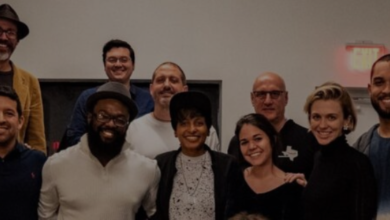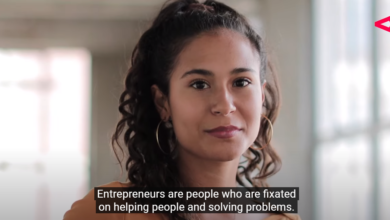The Door is Open to Venture Capital, Why are We Told We Need an Intro?

Very common advice in startup communities: that the way to get connected to investors is with a warm introduction. Not a week goes by that I don’t hear it, read it, or am part of such a discussion on a panel. Prompting this article, was being asked to answer on Quora, ‘Why are VCs so adamant about warm intros?‘
And it struck me that the notion is not only misleading, it’s actually a practice that some have (expecting intros) that needs to end.
As I’ve slept on my reply on my reply that that specific question, I found I was getting more and more angry, given the fact that expecting an introduction means someone must have that network that can introduce. Access. And it’s that access that severely burdens people of color, women, younger entrepreneurs, first time founders, and even immigrant entrepreneurs, who are less likely connected to some intermediary who will bless that you can have a conversation with a venture capitalist.
The idea perpetuated that you need an introduction is toxic. And frankly, it’s misleading; the job of a Venture Capitalist is to foster entrepreneurs to the point that they are fundable — most I know have an open door.
A mindset that you might hold as an entrepreneur or artist raising capital? “Warm intros to don’t matter. If they do, that’s not an investor I want.“
And frankly, warm intros don’t matter.
It’s said that they do because most time spent as an investor is time wading through things inappropriate to venture capital. The phrase is a filter.
It’s important to appreciate that “Venture Capital” is in fact not appropriate to most new businesses and startups – only about 1% of all new ventures raise venture capital; with overwhelmingly most capital coming from friends & family, bootstraps, loans, grants, and customers.
The notion that one can benefit from an introduction is a result of a filter needing to exist to help ease the calendars of inundated investors; but an introduction is absolutely NOT something needed — that Venture Capitalist is there to help you determine IF that path is relevant to what you’re doing.
And their door is open. At least, it should be; and you can expect it to be.
What we might appreciate is that it isn’t founders’ fault such a filter is needed; it’s investors’ fault.
Overwhelmingly, most founders think of funding as something they’re owed or that’s available. That, funding is merely a matter of getting it.
And that is founders’ fault, but bear with me, only sort-of founders’ fault because someone is misleading them.
Founders may not think this about what they’re doing, nor explicitly say it, but they certainly act as though they’re due. Some examples:
- Founders ask for a mere intro to a VC because it’s someone their connection knows
- Founders reach out with the “if you know anyone who might be interested…” email
- Founders ask a peer if they know anyone at [given firm]
Easily, 90% of inquires about funding come through one of those contexts.
I probably get 40 such emails a day.
And what they’re all saying, essentially, is, “I’ve done the work and we’re fundable. Now you do the work because this will be good for you to facilitate a good investment; I’m due and someone will want to give us money.”
Follow? There is nothing personal about such communications, no intel, no research, no insight to the investment, no indication of ROI. “Do YOU know anyone who would invest in MY company?”
- Just because I know someone doesn’t mean I have any sense for if they care about what you’re doing.
- I have no idea who might be interested in your thing; I’m focused on my thing, and maybe their thing, but all you’ve given me to work with is a cold inquiry and maybe a pitch deck.
- If you can’t tell if I know someone at [given firm], you’re not fundable (because knowing that is running-a-company-101). This is the easiest thing in the world to figure out; see LinkedIn, AngelList, and FounderSuite. Do **I** know someone? — I don’t know, do I?
What logically manifests in environments where everyone is inundating inboxes with presumptions and expectation?
Advice and replies devolve into a friendly way in which to say, “no…. because you aren’t doing the minimum work expected of you to raise capital. You’re asking me to do it for you.”
Translated nicely (but misleadingly) that becomes, “you’d do better with a warm intro.”
Instead of making that connection wherein the intermediary is poorly prepared to make it, the feedback generally manifests as, “you probably know someone who can best/better help. Get that warm intro.”
What people are really saying is, “I can’t help, good luck.”
And that interaction transpires because founders aren’t doing the work to determine who might be interested in what they’re doing and they led to believe the door isn’t open to a conversation.
And society, in time, concludes the intro is how it works. And we perpetuate a vicious cycle of the insiders having access and the outsiders not… so vicious is that cycle that organizations and brokers exist which will charge you money just so you can talk to “their” investors; making matters worse for everyone.
Because you don’t need an intro.
The intro isn’t a way to better secure funding.
The intro is how the world is trying to filter a process that otherwise works inefficiently.
VCs WANT to invest. It’s their job. It’s their passion.
You need to be relevant and meaningful.
Your job as a founder (who needs and wants funding) is to build a company that is fundable.
And what would be one of the FIRST indicators that a company is fundable?
That investors are aware of it.
Are they?
If they aren’t, you need an intro; don’t you? (No, you don’t! It just seems like you do because you don’t know any of them because they don’t know you!).
Why aren’t they aware of you?
I’ll let you in on a little secret, Marketing is as pertinent to your funding as it is to your plans, growth, and customers.
And most founders don’t do it well in either case (Marketing, that is); let alone Marketing for funding.
I’ll bet, my saying that is foreign to most people reading this. “Marketing for funding?! Why would I use Marketing to raise money??”
Profiling customers (investors). Knowing partners (related firms or resources). Being present in their channels. Creating awareness and influencing attention on what you’re doing. Creating a business and product that is appealing to that segment of your market.
You do that and investors will know about YOU.
That starts not with a PITCH, email, nor LinkedIn connection, it starts with a story.
“All VCs respond to a good story. If you can weave a tale, VCs will respond. Someone you know is more likely to introduce you to someone they know if you have a compelling story.
How will you know your story is compelling? When the 30-minute meeting stretches past an hour.
A good story is why a startup is able to raise new capital year over year in exponential amounts. A good story is why Uber and Lyft and Airbnb had an average of 136 investors each.
It is a smart business person who recognizes their story does not resonate. Be willing to accept defeat and move on to your next idea.
Trust me when I say, the world loves a good story.”
– Joseph Aaron, Founder Third Round Capital Analytics and Economic Futurist
Joseph’s advice struck me to my core as it’s the “birthday” of the book from one of our favorite startup mentors, Lyn Graft, who has helped distinguish that the story matters more than anything else. Founder of Storytelling for Entrepreneurs and author of Start With Story, “Your ‘why’ matters when it comes to telling your startup story. In fact, knowing your ‘why’ is one of the secrets to great entrepreneurial storytelling. One reason as Author and TEDx speaker, Simon Sinek, so eloquently said, ‘People don’t buy what you do, they buy why you do it.””
The coveted place to be in fundraising is on the side of the table where you can say “No” to investors rather than so many of them saying no to you.
Be that. Build that.
Investors WANT that and when you are that, they’ll be asking for an intro to you. If you’re not fundable (competitive and with an eye toward an exit), warm intros don’t matter.
They don’t care about a warm intro to them. Trust me, only insane investors and old boys clubs invest because a friend said they should. A venture capital firm has a diverse team of Executives- and Entrepreneurs-in-Residence, Partners, Venture Partners, Principals, Associates, Interns, and Analyst; because, in fairness, with only 24 hours in a day, that Partner you have in mind can only manage so many meetings. But the door is open and it’s open by way of people who are involved so that you can share your story with the firm and learn what to do to meet their needs and expectations as a source of capital.
They do care that you and your venture are fundable; think of a warm intro as nothing more than it is in any other context, a way to break the ice.
And if you’re being diligent in your job of starting a venture, breaking that ice is something you should be doing every day, looking to Wikipedia, our wiki of investors, LinkedIn, AngelList, and FounderSuite to get to know WHY certain people will be drawn to consider investing in your story. The ice is best broken by you knowing what to do to appeal to the investors meaningful to your work.
This is the investors fault??
For all that encouragement and focus on how the founder thinks and works, why did I above say it’s only sort-of founders’ fault, and that they’re being misled??
Appreciate that something causes untold numbers of entrepreneurs to expect venture capital. Something causes all these startups to reach out with a generic email, get frustrated, and perpetuate this myth that intros matter.
What causes that?? Watch for…
- Misleading language in articles, guides, videos, etc. Words matter so when society refers to “venture capital” or “venture capitalists” as a source of funding, it’s natural that we all conclude it’s meant for and available to all. Venture capital is funding managed by a “Venture Capitalist” (a General Partner), focused on investing in ventures that *can* deliver a 10x return by way of an exit. If you’re not that, VC doesn’t apply; that’s not wrong of it, that’s just what it is.
- Funds and venture capitalists who aren’t explicit about their focus, expectations, and resources. There is nothing worse than a VC who, trying to be supportive, with the best of intentions, says something like, “we want to meet with everyone, we’re here to help.” If you know how Oil & Gas works, you probably have no idea how Video Game Development works and if you have $10MM or $300MM, HOW you can “help” is drastically different. Make sure people with whom you are talking about funding are explicit about exactly what they fund, with how much, and their experience.
- Resource providers or intermediaries acting as gatekeepers. A VC fund has to have a meaningful amount of capital so as to actually operate and capably invest, lose a lot (yes, venture capital firms invest in a lot of failures), and still find ROI (return on investment) in their investments that work out. Typically, that’s $100 Million in a fund (more or less). Less than that? Just be careful of what they say because they likely have to be more risk averse. And gatekeepers? Gatekeepers just suck. This is not an old boys club. It is not a pay to play scheme. You do not need to join anything to meet genuine venture capital investors. Avoid paying for things that promise access or funding; their business is literally built on, “a warm intro is better,” – which is why it’s heard so often. Just remember, no it’s not better and it’s certainly not worth paying for.
The door to venture capital is open. And we’re working to kick it open even further. Thanks to some great partners, such as Regions Bank, The Experience Firm, and Ecliptic Capital, and a host of Venture Capitalists and incredible startup programs getting together at Funded House in Austin, during SXSW, the door is open.
If you’re a startup seeking venture capital funding, register here.








Adamant no, but lots of hesitation without an intro. So much noise and scams I can understand.
It’s signal to noise ratio. When you’re getting 20-40 cold inbounds on top of your usual couple hundred emails per day, it comes down to hours in a day.
Absolutely. It’s a filter. And the fact that we need a filter should be what’s discussed and improved upon; the notion that an intro is needed is mislead. What VCs need are fundable ventures; intros merely cut through noise that shouldn’t even be there.
My perspective is likely different in that I’m raising from angels rather than institutional investors but many points are also the same.
“And it’s that access that severely burdens people of color, women, younger entrepreneurs, first time founders, and even immigrant entrepreneurs, who are less likely connected to some intermediary who will bless that you can have a conversation with a venture capitalist.”
You hit the nail on the head with this. This is something I’ve had to build over years and although I’m grateful for it today, it can be frustrating to believe that is the only way to get access.
You’re right that VCs will find you and that you don’t need a warm intro. In 2018 when we pivoted, we started and continue to have VC’s and PE firms reach out to us. They never disclose how they heard about us and always say “we do our research” or “we have our ways.” ? I’ve found that if you’re a fundable company and likely hitting the traction points they’re watching for (and can be found online), they know about you and will reach out if they want to work with you.
I’ve actually had LP’s reach out to their fund and give me a stellar intro, only to have their deal flow team or GP continue to ignore or blow off an initial meeting with me. My biggest pain point in Texas was always getting that first intro. I’ve had to get 3-4 people to intro me to someone and even then, sometimes they won’t take the time to talk to me. It is highly guarded with lots of gatekeepers. I’ve found SF to be extremely different. People are quick to give you an intro (assuming you have a legitimate business) and meet with you.
The part that is very much an old boys club and requires an intro, I’ve found, is with fundraising with angels. Since they’re typically “hobbyist,” they aren’t doing as much research and get deals by word of mouth or warm intros. Would it make sense that Austin’s angel scene grew into the VC scene and carried that same mindset with them?
I still feel Austin is a wonderful place to build a company and the tech scene is so warm and collaborative (I mean look at this FB group!) but I understand why people tell you to leave Texas if you want to raise money. I think we’ll get there but we’ll only get there if we continue asking these questions.
With more options for funding comes more options for how you grow or operate the business.
Chris Palmisano you’re right. I think most people (or more of early founders) don’t know what options actually exist.
Vi Nguyen Great perspective thank you.
Angel is not where I have much experience or focus, as we know, but my observation is pretty consistent with what you’re saying. That is, that in Texas, “Angel” often refers to hobbyist. On the coasts, Angel means someone very intentionally and actively a startup investor, with the means, to lose it, and practically philanthropic in that they are investing in what they know; paying it forward.
Someone NOT that? That’s a “business investor;” someone understandably expecting more customers or revenue because their mindset isn’t “Angel” it’s “Business”
And agree wholeheartedly that that distinction is a major factor in why it’s so different. Such people who just have a bit and want to Hobby in startups, there, give the money to Venture Funds; they don’t do it themselves (that’s insane when you don’t know how this stuff works!) Hobby Angels are really LPs in Funds. Here, they favor doing it themselves. Yes, it would make sense that Austin’s angel scene grew into the VC scene… but rather than waiting for exists and outcomes, as this city seems to say it’s doing, they’d start pooling the money into Funds and hiring Directors, Partners, and Principals who know what they’re doing.
Excellent article! I learned 6mos into my start up journey that introductions are not needed but what was is a story and traction within the market. Make a big noise they can hear from where they sit. Earn it first, they go get it.
Brilliantly well put the point that it took me pages to make LOL ? thank you Raymond!
“The job of a Venture Capitalist is to foster entrepreneurs to the point that they are fundable”
I disagree. The job of a VC is to return an investment for their investors. This simple fact needs to permeate the relationship. When you keep that in mind, you realize the founders only handle one company whereas the VCs handle tens, if not hundreds, and their primary responsibility is to the people who pay the bills.
Warm introductions aren’t just a popularity contest or a racial contest, they are proof that the entrepreneur knows how to make an Ask. An Ask is important if it is vendor negotiations, a meeting, or a sale.
In this world, you don’t get what you deserve, you get what you negotiate/Ask for.
To tie this all together, warm intros are important because it shows an entrepreneur knows how to identify and attack. It shows an initiative is being taken as opposed to waiting for things to happen. Because VCs have the same 24 hours in a day that everyone else does and they oversee more companies to return a profit for investors, the entrepreneur needs to make a point of standing out (and be revenuing).
Agree to somewhat disagree. The most notable VCs in the world are the ones out there supporting the startups. The ones with whom I raised capital, work with founders so that they know how to build the companies that deliver those returns.
VCs raise capital as much as they’re responsble for deploying it. If the founders don’t know about or won’t work with the VC, they’re going to have a hell of a time raising money.
Absolutely agree that their first job is to investors. And that most don’t realize this. But if that was their only responsibility, they could sit in private equity offices or invest it far more wisely in real estate.
If investors are paying the bills, the founders and startup are the product. I wouldn’t work with a VC would isn’t there to improve the product.
In my experience, and granted, that’s my experience, you get what you deserve and ask for. Deserving of VC means meeting its expectations, not negotiating it. And there is nothing preventing anyone from asking it directly of VCs.
Great post!
I’m a VC. My door is indeed usually open, but I don’t want to be treated like a customer.
I’ve worked in VC and was left with an unfavorable impression of the industry. I’m curious what you mean.
Lydia Musher I don’t want to be sold anything, and I don’t like hearing business narratives changed to fit my criteria. It’s disappointingly transparent and precludes us from having a genuinely serious conversation about your business.
Maybe you missed my point (maybe not). I’m advising founders that they should treat VCs like customers.
A VC is NOT a gatekeeper, smarter, better, right, or otherwise. Hopefully, on that we agree. The challenge isn’t as much how VCs behave (there are a88hole investors and there are philanthropic investors), it’s that founders often think those things and that enables the a88holes and obfuscates the good VCs. Hence the provocation to founders, STOP thinking those things…. think of a VC as a customer.
And a CMO would say that a customer is not “sold to;” rather, that the job of a business is to create value that creates customers.
And through that lens, and my experience on both sides of the table, is absolutely that founders should treat investors like customers: create value that creates investor demand.
Hell, I desperately want that when I’m on the investment side. I want conversations with founders who are creating value I seek.
I don’t want a pitch for Pepsi when what I value is Coke. I’m not right, wrong, better, worse, smarter, dumber, or any threshold or blessing any founder needs to get; I have my preferences, interests, and experiences, and I do business with businesses from which I derive value. That’s a customer.
What do businesses do with customers? (what should startups do with investors?) – get to know them, research them, nurture them, listen to them and build what they want, so that they seek you out and give you money for the product/service you have to offer.
I’m intrigued that, in Texas in particular, my point was interpreted by some to mean “sell to investors,” because one of the most frequently discussed challenges in the Texas startup scene is the distinction of Sales vs. Marketing and how Texas is very sales oriented, whereas the coasts are very marketing oriented. The challenge founders have HERE, with investors, is the fixation on Sales, “how many customers do you have?” “how much revenue do you have?” when in other venture capital communities, the questions are oriented to competitive advantage, ROI, and market share.
Nurture investors as customers because as a founder, you are very much so creating and delivering a product that has to be of value to that source of capital and deliver that value in the form of returns. If you, as a founder, see investors as in this ivory tower that is just there to take over your business in exchange for that funding that everyone seems to be getting, you’re doing it wrong.
Have invites gone out for this?
No, not that I’ve heard; I’ll ask the team the plans for that. Most of the work/focus is still on programming, speakers, partners, and VCs
Phenomenal post man.
Thanks for hosting again this year. Can Angels stop by or only VCs?
Can I first just say that I love you for asking
There is a difference. And it’s an important one for founders and Entrepreneurs to understand; and I think a ton of our challenges in startup communities is this not being understood. Thank you!!
Programming is designed for VC expectations and ROI. Startups that get matched and in usually have to be post-seed. Objective is making sure the focus of conversations and meetings is past that initial set of challenges and questions.
But! RSVP no matter. Specific programming and private(ish) events throughout are tailored to different audiences.
What’s your take on people who want to enter startupland as an employee? Are warm introductions more necessary there?
Frankly, an extreme take; thinking of startups as having jobs (employees) is where/why most fail. Employees need salaries, benefits, stability, and structure – everything a “startup” is distinctly not. Startups don’t know their business business model yet so they certainly can’t (shouldn’t) establish with people a promise of employment. People tend to “work” for startups, on average, about 18 months before moving on to the next; that’s not a job, that’s a gig.
Don’t misunderstand, I get what you’re asking; I’m just sharing my perspective since that’s sort of what you asked. People who want to work for startups should “work for startups.” Plural being the key there. If someone wants to work for a startup, and has the mistaken impression that it will be stable, work out, last, etc., they’re in for disappointment.
Are warm introductions more valuable there in doing that?? I think ABSOLUTELY.
But not because they’re jobs, because startups are teams. Cultures. The ideal startup team is mission driven, committed, & passionate. That’s far more valuable alignment than skills/jobs. That’s a match best made through people.
https://www.quora.com/Why-do-employees-in-the-tech-industry-advise-to-not-work-at-a-startup/answer/Paul-OBrien-1
Paul O’Brien this is incredibly insightful. Why I’m struggling with it is my current aspiration is to join a company moving from figuring out how to make a product to how to be a full fledged business.
The struggle you’re talking about is the one that I want to help companies bridge. Almost like employee #1 if we frame it like you have. The security of it is not my primary concern. I just think there’s a real opportunity to help startups bridge the gap.
How would you frame that thought?
Big topic in and of itself. Might be something to the notion of a Texas Startup workforce summit where things like this can be explored together. Recruiting, outsourcing, cap tables, compensation, valuations, stages, expectations…
Frame the goal?
My point previously, though it was underlying: YOU are the job. You’re not seeking a job at a startup to do that; you do that. You are that. Startups (S) would employ you to do that for them.
This is actually what I was for most of my startup career. I was a CMO for startups; 2-3 at a time, 12-24 months, usually A-B stage.
I wasn’t looking for the job, that’s what I was. Startups looked to me. The catch is really appreciating how that’s not typical employment! That’s not really part-time nor consulting either.
My website, my LinkedIn, and my social media were all oriented to me as a business being that. The challenge of course, particularly with startups, is that it doesn’t always work out… in fact, 90% of the time it won’t. So how then, as an “employee” like this, can we build a reputation of success when most things NATURALLY will fail? Being better than that rate.
Investors in particularly appreciate that if you can merely move the rate of failure from 90% to 80%, it’s HUGE.
If instead you’re really looking to ONE role. Two thoughts
1. It’s a marriage. Find the shared values, passion, and goals together. WHAT you all do along the way isn’t as important as your love together for doing it.
2. That means alignment on Mission, Vision, and Values. And a commitment to see that through no matter the cost (Till death do us part).
Who knows if I’m right in that but this is the way I’m trying to build a new kind of company in MediaTech Ventures. We don’t have jobs. We won’t. We have in our team entrepreneurs who will see through what we’ve set out to do. What does that look like in terms of roles? compensation? etc.? Who knows, it could be different tomorrow. If you’re on the same journey with us; we might as well figure it out together. Someone coming to us saying they’d like to work with us, are curious about jobs, or need to get paid X, aren’t right. Someone coming to us saying, “I desperately want to see that happen too, let’s go, I’ll do X” fit right in.
Paul O’Brien I really appreciate the amount of thought you put into this response. It’s very helpful. Helps me reframe some things.
Cheers Andrew; it has certainly sparked some discussion from all sides. Best we can hope for in trying to change and improve the world is that; right or wrong, at least we try 🙂
Couldn’t agree more Paul. If no one ever tried, the world would rarely change. Fortunately, there are enough people like you that try.
I’ve just started on with a private equity firm and I can’t back this message enough
Hey! Congrats and good luck. Let us all know how we can help that. Moving private equity into innovation is a major piece of the puzzle.
Will do. I’m going to be filing for an LLC to start back up, as I’ve just signed several provider contracts for both investable assets and insurance products.
The private equity part is the latchkey, as I’m working as a broker for them whilst growing the advisory business to provide a truly comprehensive wealth management niche.
Love this! Also, if you need Greenbelt Kombucha for the funded house I’m game.
I think you’re talking about newer VCs with smaller funds. The top tier VCs on Twitter and various podcasts are the ones who want the warm intro and these people are the first choice for founders (because they offer more than just cash).
Anyone who follows them on Twitter and listens to the podcasts will be reminded daily that warm intros are important (to them).
I’m not sure if I got an invite etc.
Did I sign up with Radical Equity Fund?
Did I sign up with Viva? ???
We’ve been more focused on programming and just started more invites. Will take a look.
I have a great idea and business plan but I’m struggling with development and funding. Is this a good place to start researching and trying to find the right way to go about things from a very early stage prospective? Websites are getting almost 10k hits a month but no product yet (but also no marketing either, so 10k hits just from people randomly looking). Anyone have tips/advice?
For the record I’m building a cryptocurrency-based internet gaming and banking service if anyone is interested and would like to know more info
Yes, this is the time and place to start so that you start figuring out from where capital might come, IF it will, and how; so that you can build the business toward what that capital expects.
To be clear, that doesn’t mean Venture Capital, per se. Only maybe 1% of things get VC.
Start talking to and about Business Partners with money, Angels, incubators, loans (eh…), Etc. Learn from where it might come and what they takes.
Odds are (typically?)
1. Your own pockets
2. Family
3. Debt.
4. Friends
5. Partners…
Then maybe investors, loans, or grants.
No one gets funding outright. But you should start asking about and exploring it now (well before you need it)
Yeah I’m trying to bootstrap for sure and recently met a potential investor/partner. My URLs are already appraised at 20k and that’s 16 separate URLs that don’t even include the package-added value. I know building a product, a userbase, and solid numbers and growth would solve all my problems – the challenge is getting to that point! Getting games developed has been insanely challenging. I have a good direction now, now that cryptocurrency is better known (bought the urls 6+ years ago and working on this ever since), I’m using freelancer.com at the moment. But I’m really hungry to learn about this world and everything I need to maximize the opportunity for the success of my business.
I think it’s just the laws of supply and demand… there are X,000 startups trying to raise $ for every 1 VC so the “warm intro” has become a useful, if inefficient, filtering mechanism. I know a few VCs who, when they started out, had an “open door” policy (meaning they would talk to anyone) but they were quickly overloaded and overwhelmed, and the barriers started going up. I think a few folks, like Niko Bonatsos and Jason Calacanis do a pretty good job of still being fairly open… (Jason says he reads every cold email and Niko schedules periodic office hours in different cities). But hard to do it at scale.
Also the question that drives me nuts is ““Do YOU know anyone who would invest in MY company?” — to me it’s just lazy. I love to help and make intros but that’s asking me to do all the work. Much better is, “I see you’re connected to ; she is a perfect fit for us because . Can you connect us?” That shows you did the legwork
But Paul, startup customers also value third party recommendations. Startup investors use intros to help them find and filter investment prospects. Getting an intro is way better than cold calling.
Paul O’Brien
Next to my repetitive failures you continue to be the source of most of what I know about being an entrepreneur!
That is a testimonial! Thank you Scott Mac Leod, I’m honored to know you and explore all this alongside
I loved your blog and thanks for publishing this!! Here you will come to know about the door is open to venture capital why are we told we need an intro. I am really happy to come across this exceptionally well written content. Thanks for sharing and look for more in future!!
Paul – Great article, if you are not familiar with Regulation A+, take a look at it. RegA+ is an effective & efficient way for small to mid-size companies to raise capital. In 2019 we saw $11.1billion in capital raise (using RegA+) in less then 4 years, which is almost 10% of what VC did the same year. RegA+ allows direct investments which Family Offices have been doing for the last 5 years. My last point a lot of entrepreneurs are unaware of how to structure their capital raise, they just continuing to use the same method, VC with converts as the mechanism. See what happens when you go to a VC with your company/product and you have a alternative way to structure your deal. Regulation A+ gives you those options.
Cheers Todd, good advice